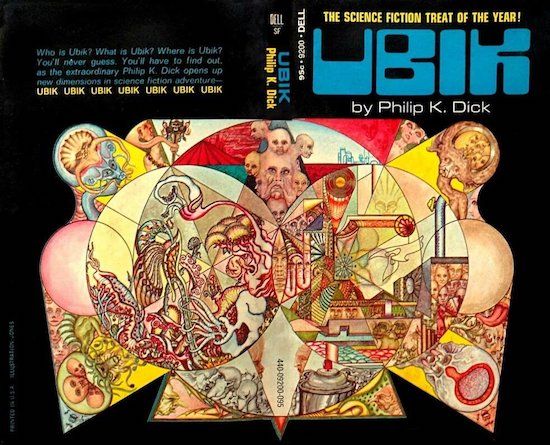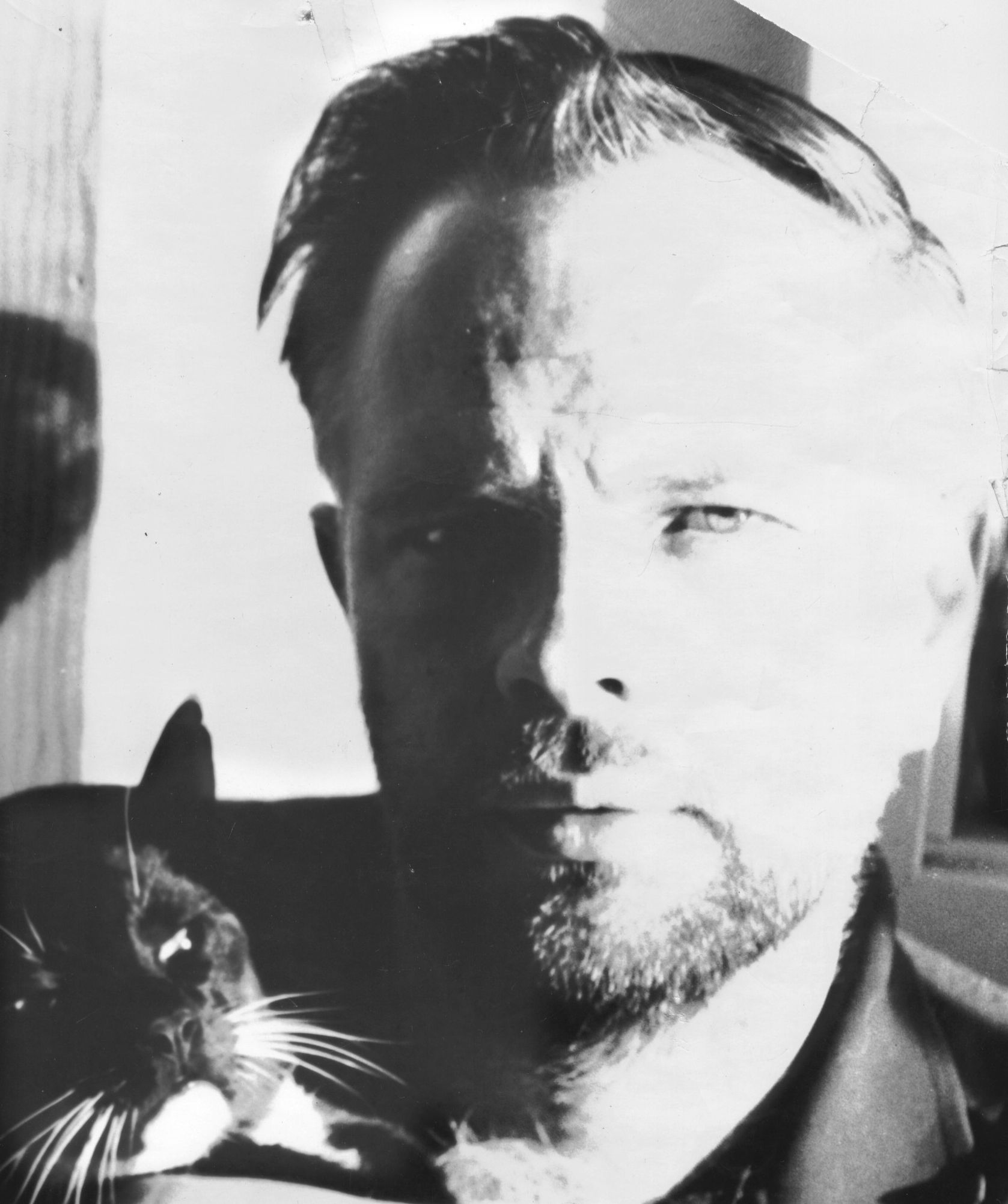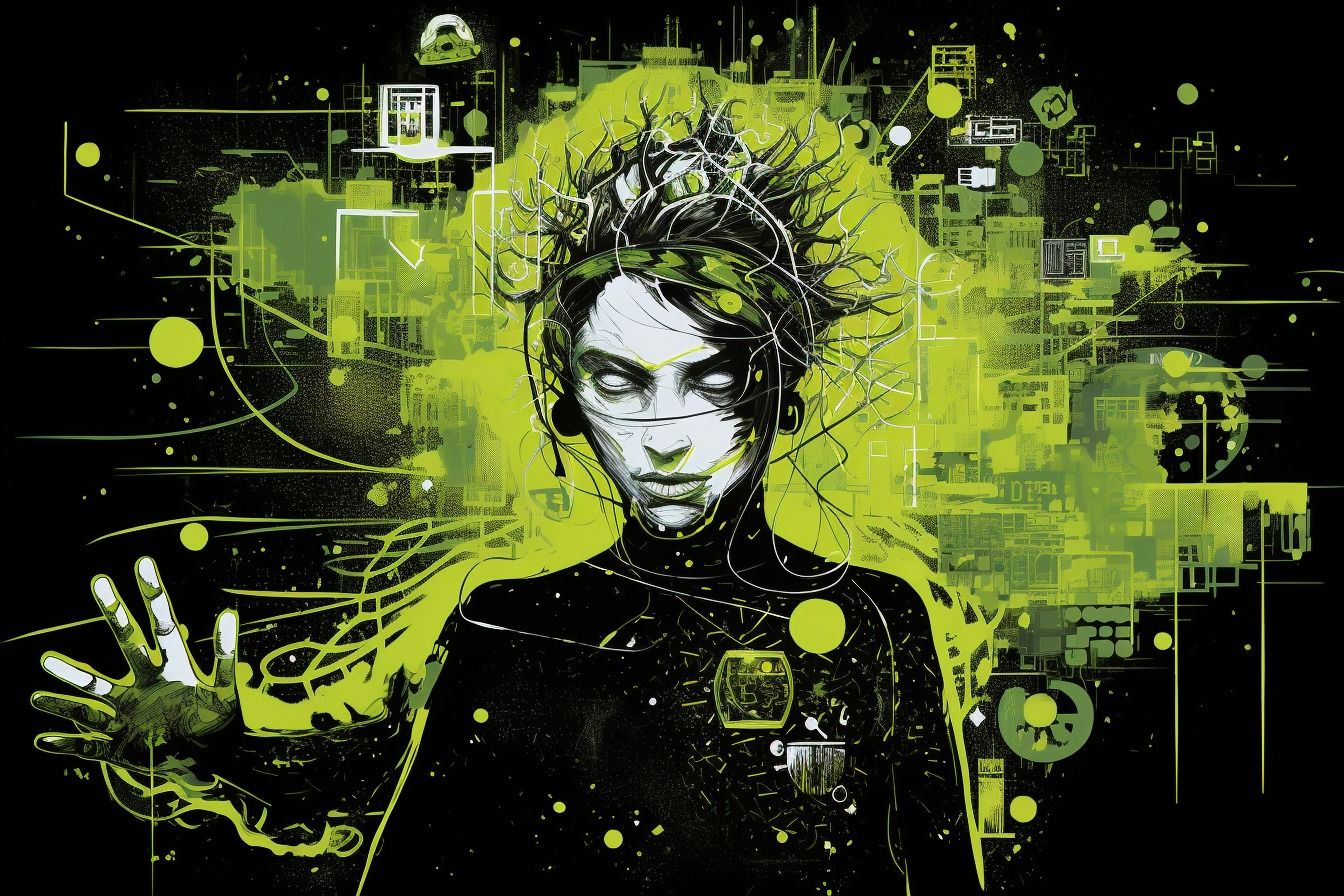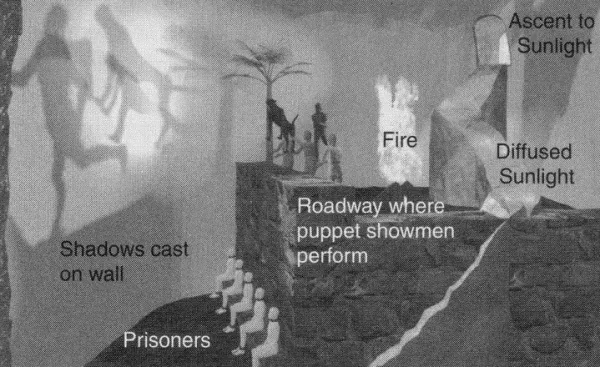Ubik or Philip K. Dick's Allegory cave
I am Ubik. Before the universe was, I am. I made the suns. I made the worlds. I created the lives and the places they inhabit.

Only those in spasmodic search for meaning and order can give voice and breath to the meaninglessness and disorder of the world. Philip K. Dick sought this order and meaning throughout his life. (A. Caronia, D. Gallo).
About Philip K. Dick's legend
Paranoid. Amphetamine addict. Sociopath. Genius. Brilliant as the fire of creative torment. These are some of the words that fill the legend of writer Philip K. Dick. But in life he was also likeable, lovable, womanizing and proud to arouse so much interest. I was not there, but I have an idea that the reality is a fusion of the two. It can only be so. He himself makes this clear in his interviews, such as the one he gave on September 24, 1977, at the Metz Festival (France): "My short stories and novels were, without my realizing it, autobiographical". And if his characters are autobiographical, then he, too, has had to be a split between different realities. We cannot judge Dick. We can only experience the effect of his works on us.
Like Water to a Fish
Dick's characters are often paranoid, divided, confused, worn out, lost, challenged.
And, often, they seem stereotypical, overwhelmed by the decaying structures around them. But they can also be illuminating, like torches that show others a way before they are consumed. The problem is that in Dick's novels and stories, showing a way is not the same as showing a way out. And if in The Matrix the threshold Neo must cross is only one, in Dick's works the thresholds are multiple interpolations.
By the way, Dick is in The Matrix (1999), as he is in Strange Days (1995), The Truman Show (1998), Being John Malkovich (1999), A Scanner Darkly (2006), Interstellar (2014). The list could be much longer and include centianaia of novels and short stories. For those who live for dystopias, uchronies, science fiction, cyberpunk, and so on, Dick is like water to a fish: he lives in it and does not realize he is immersed in it. We are swimming in Dick's narrative dimensions whenever we encounter nonbinary logics that oppose true to false, and that overlapping truths that alternate, compress, and overwrite each other.

The Power of Dickian's Books
You never get out of Dick's books. Once you get into them, you stay in them. You think about them, you reason with them, you try to understand them. You move back, you move ahead. Eventually you realize that the questions have multiplied and that the road he has pointed out is only one possibility, but in the course of your walk down that road you have found dozens and dozens of forks in the road. You realize that this is his paranoia, and you realize that you are right in the middle of it. You become addicted to what he writes, just as he became addicted to amphetamines. Because you want to understand. You want to get to the end. But each novel hints at something else. And in a narrative world without contours, with countless escape lines, anything is possible.
Ubik into the Cave
Of all his novels, Ubik, written in 1966 and published in 1969, is perhaps the most enigmatic. Each chapter has an exergue, an advertising epigraph in which Ubik is occasionally presented as a product. In the epigraph to the last chapter, Dick writes:
I am Ubik. Before the universe was, I am. I made the suns. I made the worlds. I created the lives and the places they inhabit; I move them here, I put them there. They go as I say, they do as I tell them. I am the word and my name is never spoken, the name which no one knows. I am called Ubik, but that is not my name. I am. I shall always be.
Ubik comes from the Latin word Ubique (everywhere). In the novel, it is a spray that, when used properly, becomes a stabilizer that can reverse the course of time and protect people and things from decay. All the protagonists experience the time oscillation of the world of Ubik, a universe in which, in the year 1992, individuals with psi powers (precognition, telepathy and the like) are a threat to the social, economic and political balance. To contain their manifestations, there are "prudential" companies that provide individuals called "inertials" that can neutralize the activity of telepaths and precogs. They also offer their clients security and privacy from the intrusions of psychic spies. Runciter Associates is owned by Glen Runciter and provides "inertial" services, but has lost track of a dangerous telepathic. And a psi who gets out of control could be a very serious danger.
Talents and Anti-Talents
Ubik (1969) revisits a term introduced by Philip K. Dick in his short story A World of Talent and expands on it with the concept of anti-talents. Glen Runciter's employees are anti-talents, who oppose those who possess the talents of telepathy or precognition, for example. Talents manifest a power and cause change, while anti-talents do not manifest a power and cause change, they nullify it. If a inertial is in close proximity to a person with a strong supernatural power, and the anti-talent is equivalent to the talent, the two powers will cancel each other out. Anti-talents thus counter precognitive, telepathic, parakinetic, and the like, rendering their abilities useless. Pat Conley, the Anti-Precognitionist, can prevent precognition from working by projecting part of his psyche into the past and canceling an event predicted by a precognitive. He is the only active Anti-Precognitionist in the novel.

Moratorium Beloved Brothers
But in the world of Ubik, there is also a life beyond life. This is an ethereal space where the spirit of the deceased survives death in a dimension that hovers between darkness and light, between color and mist. Stored in cryogenic facilities, the deceased can use an electronic device to communicate with their loved ones and advise them. Glen Runciter goes to the Moratorium Beloved Brothers to get advice from his wife Ella, who is kept in a state of suspended death. Here, Ella has been lying for decades in a transparent coffin. She is surrounded by a mist of frozen mist. But her mind is not what it once was: She seems confused, distant, sometimes absent. Her halflife is slowly fading.
Runciter's Fate?
Ella's advice can no longer give him what he wants, and Runciter leaves the Institute without being able to come to terms with it, only to accept a mysterious assignment on the Moon. He hopes that it has something to do with the disappearance of the psi that needs to be recovered. With him goes the head of inertials, Joe Chip, and all of Runciter's most powerful "inertials". Recently, they've been joined by one Pat Conley, who has the special ability to return to the past and change it, thus altering the future. The mission turns out to be a trap. An anthropomorphic bomb blows the group apart. Everyone is unharmed by the explosion except Glen Runciter. The others are unable to preserve him in his half-lived state. At least that is how it looks.
John Chip and The real Demiurge
After Runciter's funeral, things begin to mysteriously change: Newly purchased cigarettes dry out, coffee and milk immediately go rancid, and coins strangely begin to show Glen Runciter's face. Some inertials are mysteriously found half-mummified. In addition to this, Joe Chip begins to receive strange messages from an unknown entity that refer to a phantom Ubik. Finally, the world reverts to 1939.Joe Chip will realize that opposing forces are clashing in the cosmos when he meets Ella: Ella herself and Jory Miller, the cheeky little boy who stands beside her in the Moratorium. Jory Miller is the cause of the 1939 pseudo-world: He is the real Demiurge. But is it true?
Ubik the Almighty
In this chaos of fates, space and time, the only certainty seems to be Ubik, the Almighty. He's the one who can maintain the "stability" of all these worlds. Ubik is the verb that "exists from the beginning". It is the verb that creates worlds, realities animated by shadows. Thus, if for the Matrix the choice of the "red pill" corresponds to liberation and entry into the only accessible, albeit interactive, reality, for Ubik (and in general for Dick) this is not the case, because to liberate oneself from a state of "non-knowledge" is to enter into a series of alternative possibilities. It is the extreme of Plato's cave myth, but if in the Greek philosopher the one who freed himself from the chains and escaped the projection of shadows could reach the truth, in Dick coming out of the cave means encountering multiple possibilities, not least because the Demiurge in Dick's case is the media, manipulation, information management, the collapse of truth, and the impossibility of bipolarization. In Plato and the Matrix, there are two realities. In Ubik, "breaking" the state of things means multiplying realities. Ubik is the point of contact between "individual reality" and "collective reality", the intersection of past, present and future. It is therefore the only way to stabilize reality itself.

An Endless Allegory?
What is Ubik's ultimate truth? The established relationship between author and reader here has broken down. It can no longer be assumed that the imagination of the reader will fill in the missing spaces, as it were, to create a mental image of the world that the author describes. The whole participatory process is re-examined. In Ubik, the world has to be described by the characters themselves, if it is to exist at all. But is the revelation that the protagonists all exist only in the suspended half-life of the Zurich Moratorium, and that the only survivor is Glen Runciter, who is trying to contact Joe Chip in the half-life using Ubik-themed messages, real? Or is it just another projection in Dick's allegory cave?
“I don’t call them that; you and Al worked out that name. Don’t blame me for what you two-”
“You don’t know any more than I do,” Joe said, “about what’s happening to us and who’s attacking us. Glen, you can’t say who we’re up against because you don’t know.”
Runciter said, “I know I’m alive; I know I’m sitting out here in this consultation lounge at the moratorium.”
“Your body in the coffin,” Joe said. “Here at the Simple Shepherd Mortuary. Did you look at it?”
“No,” Runciter said, “but that isn’t really-”
“It had withered,” Joe said. “Lost bulk like Wendy’s and Al’s and Edie’s - and, in a little while, mine. Exactly the same for you; no better, no worse.”
“In your case I got Ubik-” Again Runciter broke off; a difficult-to-decipher expression appeared on his face: a combination perhaps of insight, fear and - but Joe couldn’t tell. “I got you the Ubik,” he finished.
“What is Ubik?” Joe said.
There was no answer from Runciter.
Bibliography and insights
- Bruce Gillespie, editor. Philip K. Dick: Electric Shepherd (Melbourne, Victoria: Norstrilia Press, 1975).
- Gregg Rickman. Philip K. Dick: In His Own Words (Long Beach, California: The Valentine Press/Fragments West, 1984)
- Anne R Dick. Search for Philip K. Dick, 1928-1982: A Memoir and Biography of the Science Fiction Writer (Lewiston, New York, 1995)
- Samuel J Umland, editor. Philip K Dick: Contemporary Critical Interpretations (Westport, Connecticut: Greenwood Press, 1995)
- Laurence A Rickels. I Think I Am: Philip K Dick (Minneapolis, Minnesota: University of Minnesota Press, 2010)
- THE UNRECONSTRUCTED MAN: THE FICTION OF PHILIP K. DICK, July 29th, 1988. Jeffrey W. Peacock. University of Liverpool Department of English Language and Literature.
- Philip K. Dick, Ubik.
Short Stories With Publication Dates
1952
Beyond Lies the Wub
The Gun
The Little Movement
The Skull
The Variable Man
1953
The Builder
Colony
The Commuter
The Cookie Lady
The Cosmic Poachers
The Defenders
Expendable
The Eyes Have It
The Great C (adapted into the novel Deus Irae)
The Hanging Stranger
The Impossible Planet
Impostor
The Indefatigable Frog
The Infinites
The King of the Elves
Martians Come in Clouds
Mr. Spaceship
Out in the Garden
Paycheck
Piper in the Woods
Planet for Transients
The Preserving Machine
Project: Earth
Roog
Second Variety
Some Kinds of Life
Tony and the Beetles
The Trouble with Bubbles
The World She Wanted
1954
Adjustment Team
Beyond the Door
Breakfast at Twilight
The Crawlers
The Crystal Crypt
Exhibit Piece
The Father-thing
The Golden Man
James P. Crow
Jon’s World
The Last of the Masters (aka Protection Agency)
Meddler
Of Withered Apples
A Present for Pat
Prize Ship
Progeny
Prominent Author
Sales Pitch
Shell Game
The Short Happy Life of the Brown Oxford
Small Town
Souvenir
Strange Eden
Survey Team
Time Pawn
The Turning Wheel
Upon the Dull Earth
A World of Talent
1955
Autofac
Captive Market
The Chromium Fence
Foster, You’re Dead!
The Hood Maker
Human Is
The Mold of Yancy
Nanny
Psi-man Heal My Child!
Service Call
A Surface Raid
Vulcan’s Hammer
War Veteran
1956
A Glass of Darkness
The Minority Report
Pay for the Printer
To Serve the Master
1957
Misadjustment
The Unreconstructed M
1958
Null-O
1959
Explorers We
Fair Game
Recall Mechanism
War Game
1963
All We Marsmen
The Days of Perky Pat
If There Were No Benny Cemoli
Stand-by
What’ll We Do With Ragland Park?
1964
Cantata 140
A Game of Unchance
The Little Black Box
Novelty Act
Oh, to be a Blobel!
Orpheus with Clay Feet
Precious Artifact
The Unteleported Man
The War with the Fnools
Waterspider
What the Dead Men Say
1965
Project Plowshare
Retreat Syndrome
1966
Holy Quarrel
We Can Remember It for You Wholesale
Your Appointment Will Be Yesterday
1967
Faith of Our Fathers
Return Match
1968
Not By Its Cover
The Story To End All Stories
1969
A. Lincoln, Simulacrum
The Electric Ant
1972
Cadbury, the Beaver Who Lacked
1974
The Different Stages of Love
The Pre-persons
A Little Something For Us Tempunauts
1979
The Exit Door Leads In
1980
I Hope I Shall Arrive Soon (Originally titled Frozen Journey.)
Rautavaara’s Case
Chains of Air, Web of Aether
1981
The Alien Mind
1984
Strange Memories Of Death
1987
The Day Mr. Computer Fell Out of Its Tree
The Eye of The Sibyl
Fawn, Look Back
Stability
1988
Goodbye, Vincent
2010
Menace React (fragment)
Non-Fiction With Publication Dates
The Dark Haired Girl (1988)
The Shifting Realities of Philip K. Dick: Selected Literary and Philosophical Writings (1995)
The Exegesis of Philip K. Dick, Jonathan Lethem and Pamela Jackson, eds. (2011)
The Selected Letters of Philip K. Dick, 1938–1971 (1996)
The Selected Letters of Philip K. Dick, 1972–1973 (1994)
The Selected Letters of Philip K. Dick, 1974 (1991)
The Selected Letters of Philip K. Dick, 1975–1976 (1993)
The Selected Letters of Philip K. Dick, 1977–1979 (1993)
The Selected Letters of Philip K. Dick, 1980–1982 (2010)
[Here]
